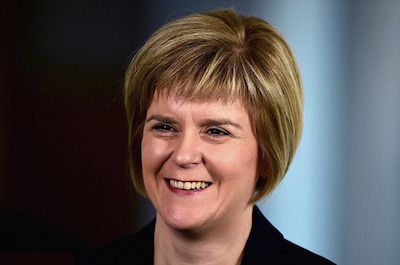
Next month’s British general election could see the Scottish National Party (SNP) win almost all of the parliamentary seats in Scotland, recreating the historic and transformative 1918 Westminster election in Ireland.
Following a triumphal performance by SNP leader Nicola Sturgeon in a television leaders’ debate this week -- a debate from which parties in the North were excluded -- the SNP could now stand to win forty seats at Westminster, according to polls.
Polling figures suggest the SNP could achieve a swing of more than 30 percent in their favour, putting them on course to potentially win all of the seats in Scotland except two, the islands of Orkney and Shetland.
A similar result for Sinn Fein in the historic 1918 Westminster election led to the Irish MPs withdrawing from the London parliament to form the first Dail in Dublin, and accelerated the momentum for Irish independence.
Parties in Ireland and Britain see the momentum for Scottish independence now reaching a similar level, but some are openly hostile to the SNP.
A smear campaign by the right-wing media in England swung into action immediately following the debate, with reports claiming that Ms Sturgeon secretly supports Tory leader David Cameron. Ms Sturgeon categorically denied the account of the Daily Telegraph newspaper, while an SNP spokesman described it as a “belated April Fool”.
DUP leader Peter Robinson has said his party would use its votes at Westminster to block nationalists.
He said: “We are unionist, we want to retain the UK. If a government was being propped up by a separatist party that was using its position in order to extract levers of separation, then clearly we could not support that,” he said.
Speaking at a party conference this week, DUP leader Peter Robinson defended a decision to form a sectarian pact with the Ulster Unionists in the North to contest the election. He said split votes “cost unionism seats and lost seats means lost influence at Westminster”.
He also attacked Sinn Fein, and said their decision to block the Stormont House Agreement over an apparent lack of funds for welfare supports “represented either an alarming act of bad faith by Sinn Fein or the most inept negotiating by republicans in the history of the process”.
Sinn Fein, for its part, dismissed the speech as “pre-election bluster”.
“The DUP’s primary interest now is in doing a self-serving deal with the British Tories whose assault on the most vulnerable in our society has caused the ongoing difficulties for the Executive,” said the party’s Fermanagh/South Tyrone candidate, sitting MP Michelle Gildernew.
“The DUP and the UUP are pro-austerity parties and have much common ground with Cameron’s cabinet of millionaires. In contrast Sinn Fein has stood against the Tory assault on public services and the welfare state.”
Sinn Fein leader Gerry Adams meanwhile unveiled his party’s election billboard: ‘A People’s Pact’, to emphasise the party’s opposition to British austerity.
The Louth TD said if local parties did a post-election deal to support larger parties at Westminster, they were effectively “signing up to austerity”.
He says talk of a hung parliament and whether his party would eventually take seats at Westminster is “a distraction”. But even in the event of a hung parliament, he said that his party would not reverse its long-held policy of abstentionism.
“The party is very settled on this issue,” he said.
Asked if he would choose between a Conservative government or a Labour administration, he rejected both options saying that in “the last 100 years very little good has come out of Westminster”.
![[Irish Republican News]](https://republican-news.org/graphics/title_gifs/rn.gif)
![[Irish Republican News]](https://republican-news.org/graphics/title_gifs/harp.gif)

